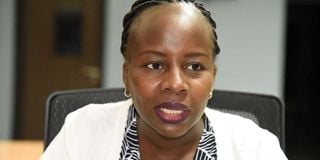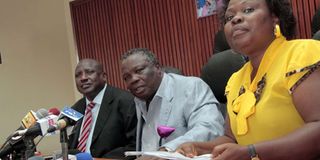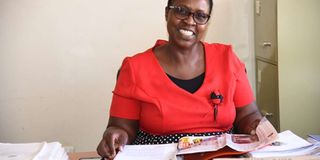The making of women trade union leaders in Kenya

What you need to know:
- COTU’s Francis Atwoli, Wilson Sossion of Knut and Secretary General of Kenya National Union of Nurses Seth Panyako are among the leaders in Kenya’s male-dominated trade union movements.
- The story of women in union leadership is one tenacious bravery that comes within a stereotypical society that looks down upon their capabilities.
- Caroline is the second assistant secretary general at COTU which has more than 2 million membership.
- Dr. Korir, a physician at Moi Teaching and Referral Hospital is the national treasurer at the KMPDU.
- Dr. Elizabeth Owino is the vice-chairperson Universities Academic Staff Union (UASU) Moi University chapter.
- Caroline Mugalla heads the East Africa Trade Union Confederation with a membership of more than 3.5 million.
- Faith Njeru is the Gender, Ethics and Governance committee in UASU.
Central Organisation Trade Union (COTU’s) Francis Atwoli, Wilson Sossion of Kenya National Union of Teachers and Seth Panyako Secretary General of Kenya National Union of Nurses are among the leaders in Kenya’s male-dominated trade union movements.
As the workforce is feminised and women come to predominate among trade union members, the next step is assuming leadership roles. It’s a story of tenacious bravery and of leadership that comes from women within a stereotypical society that looks down upon their capabilities.
The movement is thus, primed to tackle the gender pay gap and discrimination. We spoke to some women at the forefront of fighting for workers’ rights to challenge occupational segregation, unequal pay and ensure the workplace is safe, supportive and comfortable.
Dr. Daisy Korir
Dr Korir, a physician at Moi Teaching and Referral Hospital is the national treasurer at the KMPDU. In 2012, she was elected the North Rift branch treasurer of the union and occupied the office until 2014. In 2014, she was elected at national treasurer-KMPDU and she is now serving a second term in office till 2021.
There are only two women in the KMPDU out of 13 national leaders. Dr Korir regrets that most women shy away from these positions.
“Being a mother, wife, practicing doctor and a unionist requires one to have proper time management. These responsibilities tend to discourage women from seeking union positions,” she says.
In 2017, the 34-year-old spent three days in jail with other union leaders for agitating for medics pay - perhaps her lowest moment in the union and her career. The result was negotiation with the national government who eventually yielded to their demands. They got a pay rise and an introduction of the risk allowance that was non-existent despite the medics working in hazardous environment. The lowest medic used earned as low as Sh35,000 but now they earn Sh200,000.
MEDICAL CAMPS
Dr Korir says she has pushed for initiatives such as organising medical camps across the country. They have been to Siaya, Homa Bay and recently Turkana, where they donated sanitary pads and mentored young girls.
“Since we have the specialists, we also offer free screening and treatment for breast and cervical cancers to women,” says the medic.
She laments that some male leaders, especially the political class view women leaders through their sexual lenses as opposed to what they can offer.
Caroline Ruto
Caroline is the second assistant secretary general at COTU which has more than 2 million membership. No woman has held this powerful position since the inception of the trade union in 1965, and she considers it privilege.
She regrets that most women shy away from agitating for their rights due to negative societal perception.
“Most women don’t want to take up these positions because those who do so are considered to have loose morals, are single or widowed which is not the case. Women must take up these roles because with proper exposure, they achieve so much,” says the mother of two.
Caroline says more women should take up trade union roles and speak on behalf of millions of voiceless women in society.
“We have started mentoring young women to take over from us. Men can meet in bars at odd hours and lobby for the positions, but we have to balance between work, union responsibilities and our families, which is not easy,” she quips.
Caroline is a trained teacher who later worked at Kenya Power North Rift branch, in the Customer Relations department.

In 1998, she lost her husband, a trade unionist who worked for the then Kenya Power and Lighting Company (KPLC) in a tragic accident. The following year, she joined the firm following her family’s request. She would also join the KPLC’s workers’ union.
She recounts that she nurtured her leadership skills more than three decades ago while at St Roret Mixed Secondary School in Kericho County where she served as a head girl - the only girl in the prefects’ team.
Rising to her current position was not a walk in the park. But Caroline who was elected unopposed in 2003 as committee member of the
Kenya Electrical Trades and Allied Workers’ Union (Ketawu) North Rift branch is rearing to go. In 2008, she was again elected as branch treasurer, national women leader and executive board member of COTU. This happened at a time when the Kenyan Constitution that advocated for more women representation was promulgated in 2010. COTU appointed women into union committees giving more women a voice.
In 2011, Caroline was elected women representative in COTU, and is now serving her second term that ends in 2021. She is currently also the national treasurer of Ketawu, the union through which she was elected to COTU. She is also member of Wage Council and a panel member of the conciliators committee, which was formed to look into workers’ strikes.
“Whenever there is any infringement of workers’ rights, people tend to shy away from talking about it. No one should be oppressed. I only fear God; as long as I have the facts, I can face anybody,” she explains.
MATERNITY LEAVE
One issue that she and other women in union leadership have negotiated for is the amendment of the Employment Relations Act that allows breastfeeding mothers to work for 10 months, for half a day with full payment once they resume work from maternity leave.
“Women with new-borns are also exempted from night shifts under the Labour laws. Most men still believe that women belong to the kitchen and leadership is preserve of men. We need more women in leadership because women go through a lot of difficulties and they don’t have a voice because we have few at the helm,” says Caroline.
She has represented COTU in 30 countries hosting events organised by affiliated continental and international organizations.
In June 2018, she was among Kenyan trade unionists who attended the International Violence and Harassment Convention, 2019 (No. 190) in Geneva Switzerland. Women union leaders from various African countries met in Nairobi last month to discuss the ratification of the convention.
The CS in the Ministry of Public Service, Youth and Gender Affairs of Kenya Margaret Kobia graced the occasion.
Dr. Elizabeth Owino

She is the vice-chairperson Universities Academic Staff Union (UASU) Moi University chapter. Dr Owino was recently elected chairperson of the Women in Education Network in Africa. She is also the Women in Education Network East Africa chairperson to champion for the women interests in the education sector. She was a high school teacher for 20 years before joining the university. Her passion has always been to speak for the voiceless in society.
“When I joined the Moi University, I became a member of the union but soon realised there was only one other woman in leadership. Most women find it difficult to participate in union activities unless their spouses support them,” she says.
She then decided to vie for a position in 2011 and was elected as a trustee member of the union. The other member later resigned from the union leaving her the only woman at the helm.
Dr Owino observes that there are issues in institutions of higher learning that require more women to speak about such as ‘sex for marks’ incidents, suicides and domestic violence at the work places.
LOSING JOB
“In the past, there were adequate hostel warders to offer counselling services to students. But due to high numbers of admissions now, they are overwhelmed and unable to reach out to all girls,” she observes.
She notes that for most women who choose to take the route, it is tough balancing between family, work and activism. The choice sometimes comes with the risk of losing one’s job, landing in jail or family breakdown.
Has she ever landed in trouble over her role in championing for workers interests?
“No! But some lecturers have been fired for taking on the management because they put all their energies on the union. I fulfil all my teaching responsibilities so that it doesn’t create a loophole to be disciplined,” says Dr Owino, who teaches Education Psychology.
She says that although there are baby steps made in having women in trade unions, there is still a lot to be done.
At UASU, there are two women at the helm; the treasurer and an executive trustee member. And in the 31 public universities in Kenya, there is only one woman who chairs a university chapter.
“As a woman, I believe we have so much power within us. We are great influencers and usually whenever I find a woman competing against two men, I cast my vote for the woman because I believe women can achieve so much given a chance,” says Dr Owino.
Caroline Khamati Mugalla
She joined the trade union movement at the age of 24 years. At 32, she became the first woman to head a sub-regional trade union in Africa - East Africa Trade Union Confederation with a membership of more than 3.5 million.
She is the daughter to one-time COTU leader the late John Joy Mugalla. She says there are still stereotypes in the East African region on women in trade unions.
“I have had to deal with stereotyping whenever I am invited to forums. You see the doubt in someone’s face the moment you meet them for the first time. I remember an instance where throughout the email correspondences, I was referred to as ‘Mr. Mugalla’ and ‘Sir’.
“At the airport, the person picking me up expected to meet a man, I didn’t correct that but politely told them I was there to represent Mr. Mugalla. It was only when making my presentation that I told them I was the Mugalla.
“Initially, it would upset me but I have learnt to use it to my advantage. When I am asked to be a key speaker, I give it my best; that has built my confidence and made me become a reference point to women leaders in trade unions,” says Caroline.

The 39-year-old says being the head of the regional trade union movement sometimes is a daunting task.
“The multiple roles of a woman as leader is the greatest challenge. My work entails a lot of travelling. I am barely home for more than two weeks. My son is barely two years. I have turned down forums where organisers wouldn’t cater for me travelling with him, but I have also had good ones who supported me travelling with my son,” she tells The Voice.
Another challenge, she laments, has been sitting in a forum and you are only three women in a room of 30 plus participants.
She has done a lot of advocacy work representing workers at high level forums that include UNCTAD ministerial forum, AGOA’s Ministerial Forum, WTO ministerial, EU-Policy Forum on Development, Commonwealth Peoples forums.
She says she is passionate about equity and reigniting emancipation of Africa structural development to achieve sustainable development through advocacy and lobby of people centred development.
She says the union has started entrusting women to take charge of the East Africa Trade Union Confederation.
Indeed she is the first young woman to head a sub-regional trade union organisation in Africa, and since the establishment of EATUC in 1988.
“EATUC runs a program on women transformative leadership that supports and builds the capacity of women leaders in the region with a special focus on the young women in trade unions,” says Caroline.
Faith Njeru
In 2108, the lecturer at Maasai Mara University was suspended for three months by the university management for her role in agitating for workers’ better welfare.
In the same year, she was appointed to the Gender, Ethics and Governance committee in UASU; a position she has used to push for women’s interests and ‘political hygiene’ in the union politics that has been synonymous with name calling.
“We want more women to be bold and take part in leadership,” says Faith.
She says she has been able to introduce some element of diplomacy when lobbying for issues. For instance, at the university, they have created a rapport instead of rioting over issues affecting lecturers, earning them a better collective bargaining agreement (CBA).
“Being a unionist it not just about demonstrating and making noise but we want to show that if you decide to talk they will talk you seriously.”





